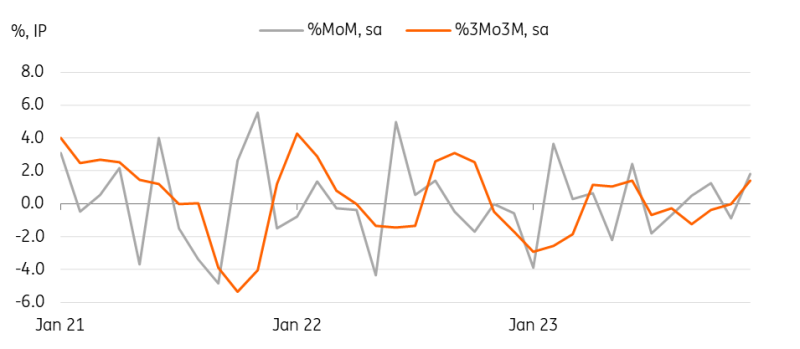Wednesday, January 31, 2024 5:10 AM EST
Industrial production rose but missed the market consensus while retail sales unexpectedly declined. Weaker-than-expected monthly data suggests any rebound in 4Q GDP should be modest. But the upturn in the semiconductor cycle and solid demand in vehicles should support growth.

Freepik
Industrial production rebounded in December, more than offsetting the November decline
December IP rose 1.8% month-on-month (seasonally adjusted), a bit weaker than expected (market consensus 2.5%) but the monthly gains were broadly based. Notably, chip-making equipment grew 5.4% for a second month and transportation equipment – vehicles (1.2%) and aircraft parts (11.3%) – rebounded. Also, as shipments grew faster (2.5%) than production, inventories were down -1.2%.
Along with today’s robust Korean IP outcome, we firmly believe that global demand for IT and vehicles is solid. We believe the negative impact of the recent earthquake should begin to appear from January's monthly data, but it should be limited and temporary, thus the underlying trend of a solid recovery in IT and vehicles will likely continue in the current quarter.
Japan IP improved compared to 3Q23

CEIC
Unexpectedly weak retail sales are a concern for near-term growth
Retail sales declined -2.9% MoM sa in December (vs 0.2% market consensus), more than offsetting the previous month's gain of 1.1%. The declines were widespread across all sectors but were most notably down in apparel (-10.7%), vehicles (-5.0%), and household machines (-8.8%). It seems like higher inflation is biting into household consumption.
GDP and BoJ outlook
The gains in manufacturing output suggest 4Q23 GDP rebounded (0.3% QoQ sa) from a mild contraction in 3Q23 (-0.7%), with the risk skewed to the upside. We think that weak retail sales should be the main drag on overall growth and that households’ cautious consumption behavior could further discourage the Bank of Japan from raising its policy rates. The economic outlook is still positive as solid corporate earnings will likely boost investment and offer solid wage gains. But, if the negative output continues, then demand-driven inflation is hardly achieved. So, it should preclude the Bank of Japan from making major policy changes in March.
More By This Author:
FX Daily: US Data Does The Talking French Inflation Eases More Than Expected China: January PMI Edged Up But Remained In Contraction
Disclaimer: This publication has been prepared by the Economic and Financial Analysis Division of ING Bank N.V. (“ING”) solely for information purposes without regard to any ...
more
Disclaimer: This publication has been prepared by the Economic and Financial Analysis Division of ING Bank N.V. (“ING”) solely for information purposes without regard to any particular user's investment objectives, financial situation, or means. ING forms part of ING Group (being for this purpose ING Group NV and its subsidiary and affiliated companies). The information in the publication is not an investment recommendation and it is not investment, legal or tax advice or an offer or solicitation to purchase or sell any financial instrument. Reasonable care has been taken to ensure that this publication is not untrue or misleading when published, but ING does not represent that it is accurate or complete. ING does not accept any liability for any direct, indirect or consequential loss arising from any use of this publication. Unless otherwise stated, any views, forecasts, or estimates are solely those of the author(s), as of the date of the publication and are subject to change without notice.
The distribution of this publication may be restricted by law or regulation in different jurisdictions and persons into whose possession this publication comes should inform themselves about, and observe, such restrictions.
Copyright and database rights protection exists in this report and it may not be reproduced, distributed or published by any person for any purpose without the prior express consent of ING. All rights are reserved. ING Bank N.V. is authorised by the Dutch Central Bank and supervised by the European Central Bank (ECB), the Dutch Central Bank (DNB) and the Dutch Authority for the Financial Markets (AFM). ING Bank N.V. is incorporated in the Netherlands (Trade Register no. 33031431 Amsterdam). In the United Kingdom this information is approved and/or communicated by ING Bank N.V., London Branch. ING Bank N.V., London Branch is deemed authorised by the Prudential Regulation Authority and is subject to regulation by the Financial Conduct Authority and limited regulation by the Prudential Regulation Authority. The nature and extent of consumer protections may differ from those for firms based in the UK. Details of the Temporary Permissions Regime, which allows EEA-based firms to operate in the UK for a limited period while seeking full authorisation, are available on the Financial Conduct Authority’s website.. ING Bank N.V., London branch is registered in England (Registration number BR000341) at 8-10 Moorgate, London EC2 6DA. For US Investors: Any person wishing to discuss this report or effect transactions in any security discussed herein should contact ING Financial Markets LLC, which is a member of the NYSE, FINRA and SIPC and part of ING, and which has accepted responsibility for the distribution of this report in the United States under applicable requirements.
less
How did you like this article? Let us know so we can better customize your reading experience.





